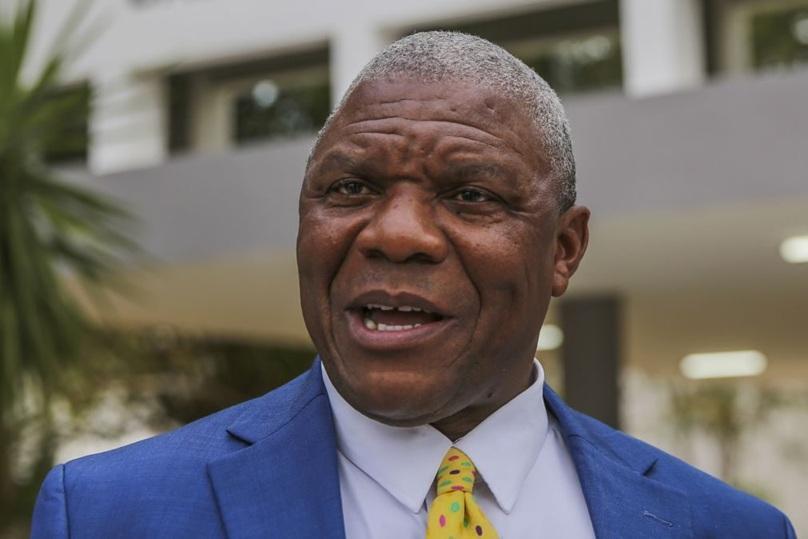Africa-Press – Mozambique. The governor of Mozambique’s northern province of Cabo Delgado, Valige Tauabo, acknowledges the current “turbulent” phase in the province with the resurgence of terrorist attacks, but guarantees that “better days” are not far off and that now is the time to invest.
“Cabo Delgado will be one of the safest provinces in the country (…). It will be one of those experiences of how to conquer a territory and consolidate stability. We are in a turbulent phase, but that doesn’t shake us or make us abandon the province,” Tauabo said in an interview with Lusa in Pemba.
The governor of the province, one of Mozambique’s richest, with large reserves of natural gas, minerals, and precious stones, among other resources, acknowledged that, after two years of relative “calm”, which allowed thousands of displaced families to return to their villages, Cabo Delgado has seen a resurgence in terrorist groups in the last three months, especially since late June.
Even so, this is on a smaller scale compared to the past terrorist attacks, which have been ongoing in Cabo Delgado since 2017. The “resilience” and “effort of the population and the Defence and Security Forces (FDS)” among the main factors leaving the governor feeling assured. “We are very confident and have great faith that better days for Cabo Delgado are not far away.”
“This is a time for those who invest. For businesspeople, this is the best time to come to Cabo Delgado and make their investments […].The doors are open. If they come tomorrow, it will be late. That will create constraints for us.” “We won’t be able to give them full satisfaction,” Tauabo warned, highlighting the province’s potential in practically all economic areas.
Even so, he didn’t hide the instability caused by attacks in recent weeks in various parts of the province, confirming casualties among the population and traditional ‘naparama’ guerrillas, who are also fighting the insurgent groups.
“We also learned that there were casualties, which we regret, and we express our solidarity with the grieving families,” he noted.
The resurgence of activity by these groups, he admitted, began to be felt at the beginning of the year: “They were eager to make their presence felt, but they weren’t alone either, because the FDS is always pursuing this group.”
He added that 2023 and 2024 were years of “reasonableness, where the population was already beginning to gain hope that better days were very close”.
“In the last three months, once again, they appear here, they appear there, moving around and scaring the population again. And now we’ve had these latest incursions from a month ago,” Tauabo admitted.
On the ground, he admits that one of the concerns was dismantling the terrorist groups’ bases and preventing the population from being used as shields in the fighting with the FDS.
“It was necessary to dismantle the bases where they were staying, thinking, planning to do harm, right? And they couldn’t stay that way. So, the FDS managed to recapture those bases. And that’s what we’re seeing now. So, they also look for areas of peace […]. The FDS is careful not to intervene in just any whatever way, because they use the population itself as a shield, they take the population with them,” Valige Tauabo explained regarding the operations on the ground.
The objective is that they are “physically found, so they can be arrested and brought to justice. This is the vision,” he added.
Elements associated with the extremist group Islamic State claimed responsibility for an attack on the village and police station of Chiúre Velho, also in southern Cabo Delgado province, on Thursday.
The claim, made through propaganda channels, is documented by a video in which the rebels, allegedly belonging to the Ahlu-Sunnah wal Jama`a (ASWJ) group, appear firing bursts of machine gun fire and entering the police station, from where they claim to have stolen material. After burning a vehicle and “freeing Muslim prisoners,” at least one person was beheaded in the town centre.
Incidents including attacks, deaths, kidnapping of farmers and fleeing populations, in villages in Ancuabe district and in the Ocua administrative post have also been reported.
Officially, agencies on the ground count at least 34,000 newly displaced people between February 20 and 25 July as a result of new insurgent attacks in the districts of Chiúre, Ancuabe, and Muidumbe.
In Chiúre alone, the wave of displaced people that has been growing since Thursday now encompasses, according to estimates given to Lusa on site, some 3,500 families, now spread across relatives’ homes and two temporary centres in schools in the town, which are closed this week.
At the Coqueiros school, in Chiúre-Sede, the district headquarters town, there are more than 1,900 families who have, since Tuesday, been receiving humanitarian aid from United Nations agencies, in a playground where women cook improvised meals while hundreds of children play almost normally, albeit without classes.
The northern province of Cabo Delgado, rich in natural gas, has been facing an armed rebellion since 2017, which has left thousands dead and a humanitarian crisis, with more than a million people displaced.
At least 349 people died in attacks by Islamic extremist groups in northern Mozambique in 2024, a 36% increase compared to the previous year, according to a study released in February by the Africa Center for Strategic Studies (ACSS).
According to the academic institution of the US Department of Defense, which studies security issues in Africa, this “recovery of violence levels” in Mozambique “reflects the strategy” of the ASWJ group – an IS affiliate operating in Cabo Delgado province – of “expanding the conflict, moving inland and into more rural areas”.
For More News And Analysis About Mozambique Follow Africa-Press






